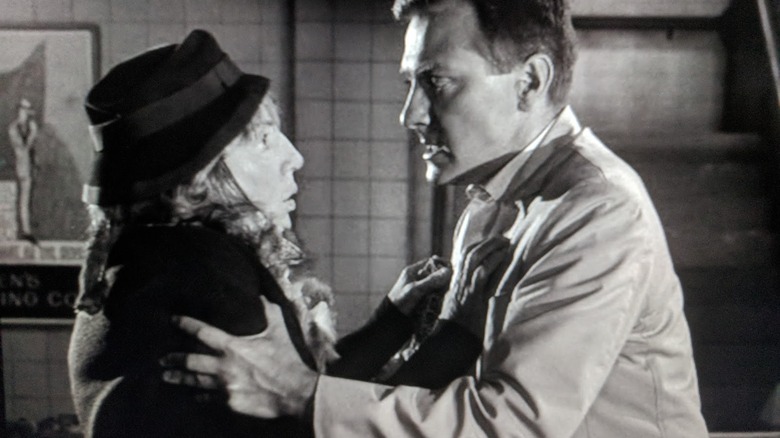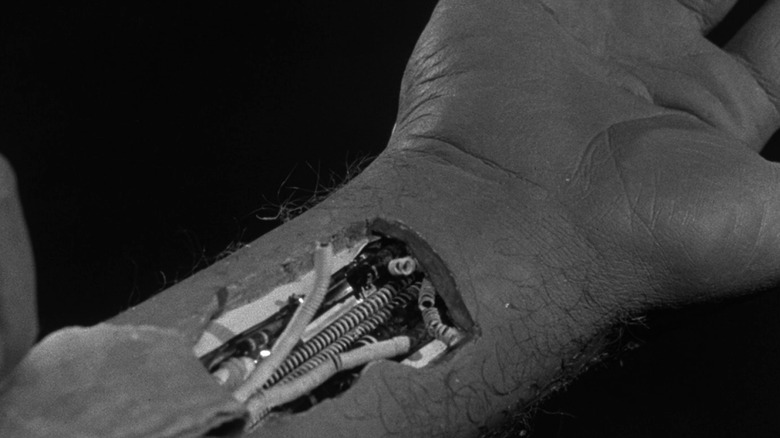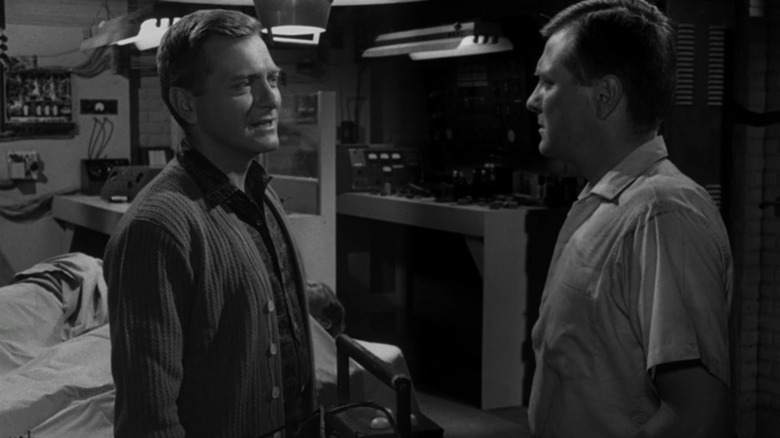This Overlooked Twilight Zone Episode Comes With A Chilling Frankensteinian Twist
The first episode of the fourth season of "The Twilight Zone" — titled "In His Image" — opens with a startling act of violence. Alan Talbot (George Grizzard) is approached by an evangelist while waiting at a subway station, and his simmering irritation with her triggers a strange sensation: electronic beeps zap his brain, leading him to push her on the tracks. The woman is killed by the oncoming train, and Alan flees, reappearing a while later with his fiancée Jessica (Gail Kobe) near his hometown. He seems to have no recollection of his transgression at the subway.
As series creator and host Rod Serling states in the episode's opening narration, this is just the beginning of the nightmarish hell Alan is about to experience, as he stands at the cusp of a world both real and dream-like. Alan's tale is based on Charles Beaumont's captivating short story "In His Image," where a man named Pete experiences the urge to kill, and during such a tense moment of internal conflict, he accidentally injures his arm, which peels back to reveal synthetic machinery:
"Beneath the flap of skin, where veins ought to have been, and cartilage, and bone, were hundreds of tiny flexible rods, jointed and gleaming, and infinitesimal springs, turning, and bright yellow coils."
The life-altering realization that one is not flesh and bone, but a machine destabilizes both Pete and Alan, who are forced to embark on a journey to seek out their maker. Anyone familiar with Mary Shelley's "Frankenstein" is aware of the horrors that await: the monstrosities inherent within artificial life are but a reflection of the hubris of its maker, doomed to destroy the unwitting creature in a noxious cycle of isolation and vengeance.
A postmodern Frankensteinian tragedy
After the incident at the subway, Alan visits his hometown in the hopes of taking a trip down memory lane, but only experiences confused frustration. No one seems to recognize or remember him, and memories of his Aunt Mildred are supplanted by the harsh truth that such a person might have never existed. Every person he thinks he knows suffers the same fate, and a visit to his parents' graves triggers an unsettling memory: the name Walter Ryder, etched on the tombstone, seems to be the key to unraveling his identity, but Alan has no more clues to grasp onto.
After a bout of homicidal rage that he struggles with and forcefully subsides, Alan is privy to his true nature as an android, for the lack of a better term, as he sees wires underneath the peeled flesh of his arm. After deciding to meet the elusive Walter, Alan realizes that the man is his double (or rather, he is the synthetic copy) and that his maker had used real memories of Couerville to gift Alan with a sense of self. As Walter drones on about his self-professed genius and how Alan is supposed to be the perfect synthetic version of him, the latter is enraged, horrified at the callous cruelty of someone playing God without having a grasp on the consequences of creation.
With time, it becomes clear that Walter does not understand his synthetic progeny — worse, he does not even try to comprehend his pain — which explains Alan's homicidal urges that manifest as a result of this neglect and trauma. This anguish is similar to what replicant Roy Batty (Rutger Hauer) experiences in "Blade Runner," where a climactic meeting with his maker ends in an act of patricide, where Roy gouges Tyrell's eyes out.
In His Image ends on a terrifying note
In "Frankenstein," the creature's impetus for hounding his maker is acute alienation, and everything he does initially is to soothe this clawing sense of isolation. There is no one else in the world like him, and his appearance and perceived morality are too volatile for society to accept, so he begs Victor to give him a mate. After Victor refuses, the creature is driven by revenge and hatred, knowing that there's no balm for his bitter self-hatred that is bound to consume him. "My protectors had departed and had broken the only link that held me to the world. For the first time the feelings of revenge and hatred filled my bosom," he states, and expresses sentiments of self-annihilation after coming across Victor's body. It is a bleak end to a careless cycle of creation birthed by a scientist driven by ambition and self-interest alone.
Walter is a postmodern Frankenstein, only without the overwhelming guilt that his novel counterpart feels after being exposed to his own cruelty. By the end of the episode, Alan attacks Walter, and only one of them emerges alive and returns to Jessica, claiming that all will be well. The survivor is revealed to be Walter, who has now taken his perfect double's place, having destroyed Alan's synthetic body back at the laboratory, who now remains forever forgotten after such a short, violent existence.
Despite being an organic being, can Walter's actions be classified as humane? Moreover, Alan's existential angst and suffering hang heavy after Walter gets his happy ending, where the murder of his progeny leads to a fresh, beautiful start. Like Mary Shelley said in her seminal work, "When falsehood can look so like the truth, who can assure themselves of certain happiness?"


